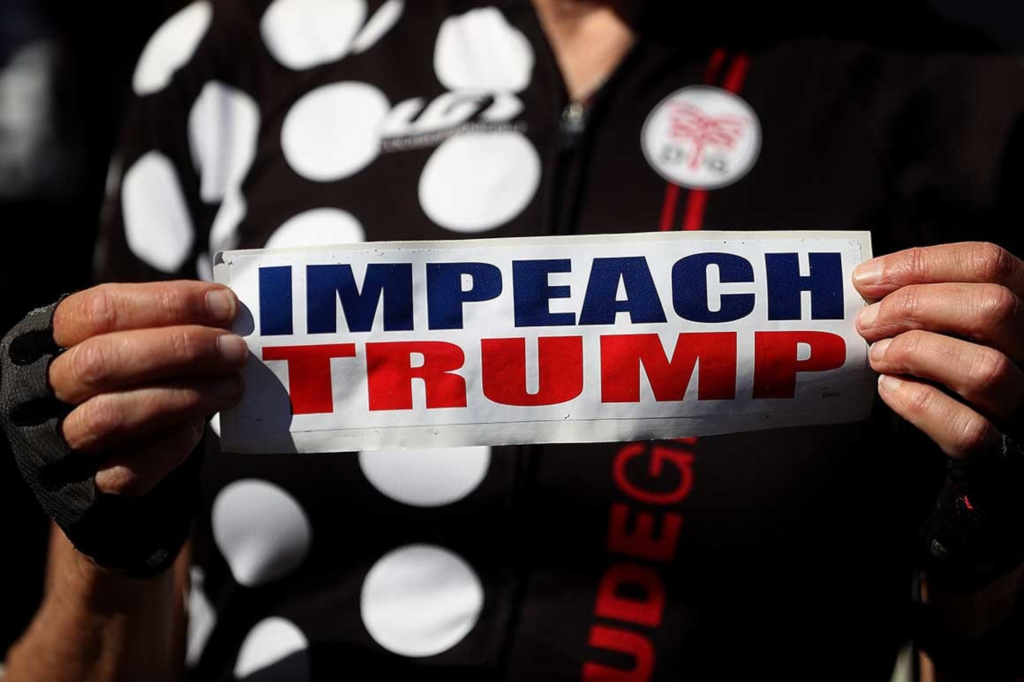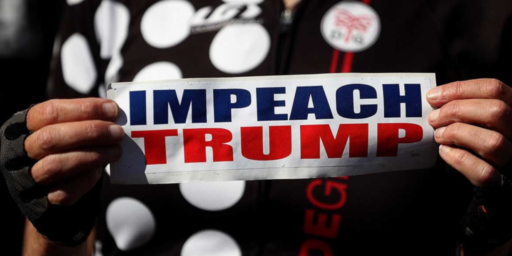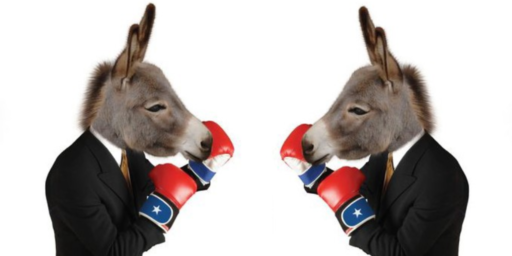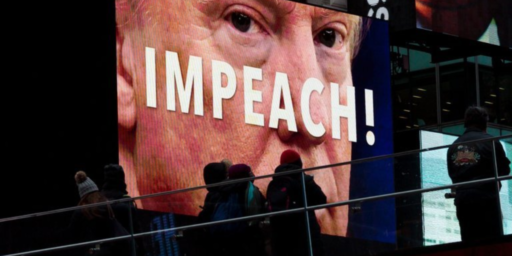With An Eye On Impeachment, Judiciary Committee Seeks Mueller Grand Jury Material
The House Judiciary Committee is seeking to obtain the material presented to a Federal Grand Jury by former Special Counsel Robert Mueller.

Shortly before leaving town for a six-week summer vacation, the House Judiciary Committee filed an application in Federal District Court in Washington seeking access to the records of the Grand Jury that had been convened by former Special Counsel Robert Mueller:
WASHINGTON — The House Judiciary Committee on Friday asked a federal judge to unseal grand jury secrets related to Robert S. Mueller III’s investigation, using the court filing to declare that lawmakers have already in effect launched an impeachment investigation of President Trump.
In a legal maneuver that carries significant political overtones, the committee told a judge that it needs access to the grand jury evidence collected by Mr. Mueller as special counsel — such as witness testimony — because it is “investigating whether to recommend articles of impeachment” against the president.
“Because Department of Justice policies will not allow prosecution of a sitting president, the United States House of Representatives is the only institution of the federal government that can now hold President Trump accountable for these actions,” the filing told the judge, Beryl A. Howell, who supervised Mr. Mueller’s grand jury.
Referring to the part of the Constitution that gives Congress the power to impeach and remove a president, the filing continued: “To do so, the House must have access to all the relevant facts and consider whether to exercise all its full Article I powers, including a constitutional power of the utmost gravity — approval of articles of impeachment.”
With the filing, the committee’s chairman, Representative Jerrold Nadler of New York, was attempting to sidestep the debate raging inside the Democratic Party over whether the full House should hold a vote to formally declare that it is opening an impeachment inquiry. By declaring that his committee was in effect conducting such an inquiry, he was heading off a politically difficult vote in the committee or the full house to pursue impeachment.
“Too much has been made of the phrase ‘an impeachment inquiry,'” Mr. Nadler said at a news conference. “We are doing what our court filing says we are doing, what I said we are doing, and that is we are using our full Article I powers to investigate the conduct of the president and to consider what remedies there are. Among other things we will consider, obviously, is whether to recommend articles of impeachment.”
Other members of the committee were more forward.“We’re now crossing a threshold with this filing, and we are now officially entering into an examination of whether or not to recommend articles of impeachment,” Representative Veronica Escobar, Democrat of Texas, declared.
Democrats hope that Judge Howell will agree that their request for the grand jury material falls into the same legal category as a Nixon-era precedent under which the committee gained access to Watergate evidence. But there is a difference that could matter: In 1974, the full House had voted to declare an impeachment inquiry opened.
(…)
Mr. Nadler said the committee would continue the investigation during the House’s six-week summer recess, calling additional witnesses and filing a lawsuit as soon as next week to force Donald F. McGahn II, the former White House counsel, to testify unless he agrees to come voluntarily. Mr. McGahn’s account of presidential behavior sits at the center of Mr. Mueller’s report.
The 448-page document showed that the Trump campaign welcomed illegal assistance from the Russians in 2016 and expected to benefit from it, but investigators did not establish that Mr. Trump had conspired with them in the illegal hacking and dumping of Democratic emails.
It also explored several episodes in which Mr. Trump tried to impede the investigation. But the special counsel decided not to render judgment about whether Mr. Trump should be charged with obstruction of justice, citing a Justice Department view that sitting presidents are temporarily immune from indictment while they are in office.
(…)
The sources of information at issue in the court filing are the portions of the Mueller report that were redacted because the information fell under a federal rule of criminal procedure that makes information presented to a grand jury secret. That rule has only limited exceptions allowing such grand jury information to be shared with outsiders.
In 1974, the Watergate prosecutor, Leon Jaworski, and his grand jury obtained a judge’s permission to send the evidence they had gathered to the House Judiciary Committee, which was already formally conducting an impeachment inquiry into Nixon.
In that case, the Nixon Justice Department did not object to letting lawmakers see the materials. In the current case, the committee is trying to get the material on its own. Attorney General William P. Barr has declined requests by Mr. Nadler to join the committee in petitioning the court.
The department did not respond to a request for comment on Friday, including on the question of whether it would sit on the sidelines or go to court to actively oppose the committee’s request for evidence.
Ordinarily, the material presented to a Grand Jury, which includes things such as transcripts of testimony, documentary evidence, and other material, is supposed to be confidential. One of the reasons for this is that such material often includes evidence and testimony about persons who were ultimately not indicted as well as material that may be privileged or otherwise inadmissible in a court proceeding. There are, however, exceptions to that rule, including the exception that such material can be released in certain circumstances. Most recently, the Judges of the District Court in Washington D.C. issued a ruling that appeared to narrow the circumstances when such material can be released. That ruling lists a limited number of circumstances in which the material can be released and makes no provision for sharing such information with Congress.
At the same time, though, the Judges did note that their predecessors had shared Watergate Grand Jury material with Congress as part of the impeachment investigation of President Nixon, In discussing that precedent, the Judges state in their ruling that the decision could be justified under the exception that allows the material to be shared “in connection with a judicial proceeding.” In that respect, the Judges reasoned that impeachment, which would lead to a trial in the Senate, is for all purposes a “judicial proceeding.” Whether that exception will be sufficient based on the Judiciary Committee’s representation that the material was needed as part of the committee’s duty to advise the House if impeachment proceedings are justified. The difference between the 1974 precedent and today The idea was that impeachment, which culminates with a trial in the Senate, is effectively a judicial proceeding. Whether the Court will accept that argument in a circumstance where the House has yet to authorize an impeachment proceeding is unclear, though.
Here’s the application:
Application for Release of … by Doug Mataconis on Scribd




Agreed but if they decline on that grounds, expect to have a formal impeachment launched almost immediately.
If, on the other hand, they give them the documentary evidence, they may not end up opening a formal impeachment inquiry.
Ironic.
Right now, people can’t claim the fifth in grand jury testimony because its confidential and thus can’t be used against them in another proceeding. If that testimony is increasingly made available outside the grand jury, we’re liable to see that change.
So my concern is this could be a penny smart, pound foolish request that hurts future corruption investigations for the sake of the current one. Which might be a worthwhile tradeoff if this was part of a serious push for impeachment, but right now the House’s oversight seems to be more about creating a spectacle that will be helpful for the 2020 election than about serious attempts to hold the administration responsible for its crimes.
“It was Mifsud who, in a 2016 meeting in London with then-Trump campaign aide George Papadopoulos, suddenly broached the possibility that the Russians might have emails and dirt on Hillary Clinton. Notably, he had that meeting just after returning from Moscow and allegedly referred to “thousands of emails.” Papadopoulos later repeated what he had been told to Australian diplomat Alexander Downer in a London pub, and Downer reported that to the U.S. government.
Ultimately, Mueller concluded there was no evidence supporting a conspiracy theory against the Trump campaign, and he found no evidence that any Trump official knowingly worked with Russian hackers or trolls. Yet Mifsud appears to be there at the genesis. What remains a curiosity is that Mueller indicted various people for false statements. Most were relatively minor criminal cases in terms of sentencing, leading to a few weeks in jail for people like Papadopoulos. The Mueller report indicates Mifsud lied repeatedly to investigators on sensitive national security issues — and yet Mueller did not charge him with a single count. Cooperating witnesses were sentenced for lying but not Mifsud. And if, perhaps, Mifsud acted on behalf of U.S. officials to create the foundation for the Russia investigation, then that raises a host of other questions.
As acknowledged by CNN’s Gergen, this is all very interesting — and it was not (as widely treated by the media) ridiculous for Republicans to raise with Mueller. The most credible point about Mifsud is that his relative anonymity in news coverage reflects a broader problem: There is a consistent effort to preserve a narrative that the Russians interfered in the 2016 election to help Trump. That was demonstrably true. However, it is not the only story. The Russians also had contacts and shared information with the Clinton campaign.
While Democrats have been highly emotive in demanding answers to the “full” story about Russian efforts, they have consistently opposed any effort to investigate such contacts within their own party or associates, dismissing that as a distraction. Likewise, documented anti-Trump bias by key players in the Russia investigation is treated as “unfortunate” or “not relevant.” There is every reason to be concerned that these same key players used people such as Mifsud to launch an investigation during the Obama administration against figures in the opposing party.”
Correct, Professor Turley